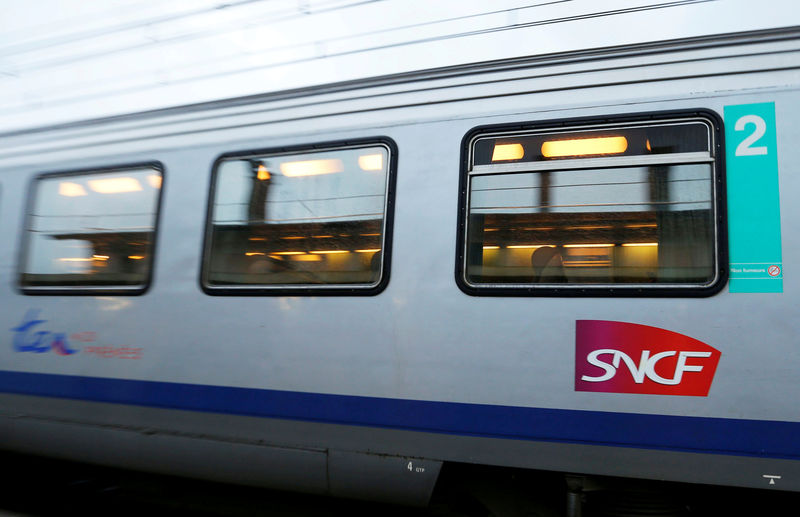 © Reuters. FILE PHOTO: The logo of SNCF is pictured on a train arriving at the French state-owned railway company SNCF station in Moissac
© Reuters. FILE PHOTO: The logo of SNCF is pictured on a train arriving at the French state-owned railway company SNCF station in MoissacBy Brian Love
PARIS (Reuters) – France’s government on Wednesday promised investment of 10 million euros a day over a decade to prepare the SNCF national railway for Europe-wide liberalization in an effort to persuade labor unions to discuss a planned shake-up of the network.
In one of his most daring reform plans so far, President Emmanuel Macron wants to scrap the job-for-life guarantees and other sizeable perks for all new hires at the SNCF, a bastion of organized labor since nationalization in the 1930s.
Transport Minister Elisabeth Borne’s offer followed a decision by the unions on Tuesday to hold fire for now on strike threats and to meet again in mid-March – a move some saw as proof of disunity.
“Nobody has anything to gain from a protracted strike,” Borne told Europe 1 radio. She promised unions that consultations on the reform would start on Thursday and last for two months.
The SNCF unions were instrumental in engineering the last retreat by a French government on major economic reforms when, in 1995, they led three weeks of strikes that forced then-prime minister Alain Juppe to resign.
Borne and the state-appointed head of SNCF, Guillaume Pepy, both rejected union warnings that the reform would kill a vital public service, arguing that the government plan foresaw investment of 36 billion euros over the next decade.
“That’s 10 million a day,” said Borne.
MACRON POPULARITY DIPS
Surveys show broad public support for SNCF reform but a poll published on Wednesday was the second in two days to show a drop in Macron’s popularity, driven by voter concerns over social and economic reform.
The BVA poll showed his approval rating at 43 percent, down four points and one point above the low he hit in October after he announced cuts in a wealth tax and social housing subsidies, prompting critics to call him the “president of the rich”.
An Odoxa poll on Monday showed a similar dip. It also showed that while 69 percent favor reform, they are more evenly split over the methods of Macron’s government, which says it will resort to direct decrees, bypassing votes in parliament, if necessary.
“Behind those voicing negative appraisals were the frequent accusations of arrogance or ‘he favors the rich’, or fears of purchasing power,” BVA said of its latest soundings. “But this month many spoke of the SNCF reform fuelling fears that public services will be dismantled or social rights eroded.”
Fusion Media or anyone involved with Fusion Media will not accept any liability for loss or damage as a result of reliance on the information including data, quotes, charts and buy/sell signals contained within this website. Please be fully informed regarding the risks and costs associated with trading the financial markets, it is one of the riskiest investment forms possible.
Source: Investing.com



























